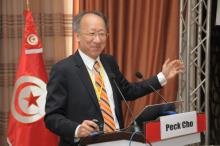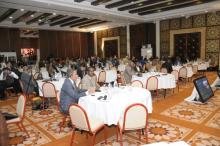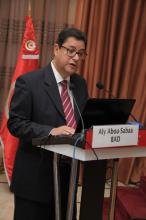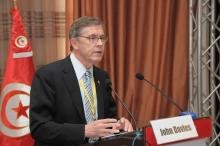The report of the First African Ministerial Forum on ICT Integration in Education and Training is now available...
News
Forum News
The First Inter-Ministerial Forum held from 9 – 11 December in Tunis ended with a call for African countries to prepare and adopt a national policy framework to integrate ICT in their education and training systems...
Education and training ministers from throughout Africa took part in a panel at the First African Ministerial Forum on ICT Integration in Education and Training in Tunis. The ministerial panel took place on 11 December, the last day of the three-day forum.
“We at ADEA are heartened by the large and quality turn-out at this event.” declared Hamidou Boukary, Acting Executive Secretary, at the official opening of the Ministerial Forum on the Integration of ICTs in Education and Training in Africa.
Half of all the schoolchildren in the world are in Africa, the forum on ICT integration on education and training being held in Tunis heard. But so many of those children, and other students, are hard to reach for reasons including geography, connectivity, health, and competing priorities.
Dr. Peck Cho, emeritus professor of the University of Dongguk, Republic of Korea, began his presentation on “ICT in Education: A Blessing or a Curse?” by taking us back in time to the 1950s, following the Japanese occupation, when Korea was “one of the poorest countries in the world”. The country’s disastrous situation at that time was reversed “within a single generation”, and Korea’s development is now founded on a flourishing economy.
In this third session, the speakers presented projects based on mobile learning conducted in their countries and on the best practices that emerged from them. Ralph Ankri, International Project Director for Orange Labs, presented Madagascar’s in-service teacher training program, a mobile-assisted learning operation. In collaboration with the Agence universitaire de la francophonie and the French Development Agency, a tutored self-training program was established, targeting 458 teachers (including 22 tutors) with an average age greater than 50 years and a low level of basic training.
The participants in this second session shared their political, institutional or private-sector experiences aimed at optimizing ICT integration so as to provide quality education for all.
Côte d’Ivoire, Kenya, the Organization of Ibero-American States for Education, Science and Culture (OEI), the Global eSchools and Communities Initiative (GESCI), and Hewlett Packard took part in this discussion.
Eminent speakers from the private sector, government, education and the development sector agreed on the crucial impact of information and communication technology (ICT) on the future of education and training in Africa on the official opening day of a ministerial forum on 10 December 2013 in Tunis.
A high level policy workshop had taken place the day before at the three-day First African Ministerial Forum in ICT Integration in Education and Training.
Obstacles lie in the way of education development in Africa, because of shortages of teachers, infrastructure, geography, access and other problems. One solution is the integration of information and communication technology (ICT) into Africa’s education and training systems, a vice president of US computer and semiconductor company, Intel, told a conference in Tunis on 9 December 2013.




